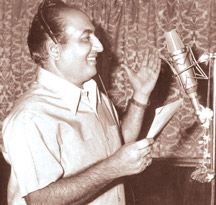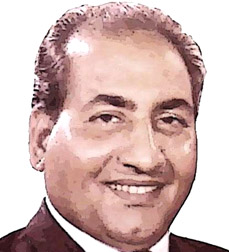|
Death anniversary:
Mohammed Rafi - Versatile singer
Sumathipala SOLANGAARACHCHI
The thirtieth death anniversary of the great Indian singer Moh'd Rafi
falls on July 31, 2010. This note is to mark the occasion and to pay
tribute to Padma Sri Mohammed Rafi.
|

Singing his heart |
Moh'd Rafi was born on December 24, 1924, in a small village named
Kotla Sultan Singh, in the district of Amritsar, in Punjab. Rafi's
ancestors came from Lahore, the city which is now partitioned to
Pakistan. Rafi's father Haaj Ali Mohammed and mother Allah Raakhi had
ten children, seven boys and three girls whose youngest was Rafi. The
eldest brother of Rafi Mohammed Hameed noticed the singing talent gifted
to Rafi and determined to help his younger brother to improve the
ability.
When Rafi was 12 years old he began to master North Indian
(Hindustani) classical music under Barkhat Ali Khan (the elder brother
of famous maestro Bade Gulaam Ali Khan), Khan Abdul Wahid Khan and
Jeevan Lal Mittu. Meanwhile, Rafi used to spend his leisure at the
barber shop run by Hameed in Lahore. The rumour that Rafi was a barber
is completely false.
The lyricist Feroz Nissami introduced Rafi to Radio Lahore where he
sang Ghazals when he was only 14. Rafi had the first opportunity to test
his talent as a playback singer in the Punjabi film named 'Gul Baloch'
on February 28, 1941. The first line of the song was Soniye ne heeriye
teri yaad ne bahut sathaya which was a duet that sung with Zeenat Begam.
Rafi's age was 16 years and 2 months at the time. Producer cum musician
of the film Shyaam Sundar was highly impressed by Rafi's singing and he
wanted to entrust Rafi singing in all his future productions.
Kundan Lal Saigal was the most appreciated male singer, at the time,
eventually Rafi was a fan of Saigal and Rafi also had a dream to sing
with Saigal some day. Before commencing a musical show of Saigal
microphones were defective and the show delayed a while, until the
apparatus being corrected. Rafi's brother Hameed pushed Rafi on to the
stage to sing in the chance. It was the first public appearance of Rafi
and he sang without microphones. The audience thoroughly enjoyed the
singing of this young boy. Noticing the boy's talent Saigal said, "Son,
you made the audience forgetting Saigal; someday you'll be a great
singer."
In 1942 Rafi was taken to Mumbai (then Bombay) by Hameed with a
recommendation letter from father of famous maestro Naushad Ali. Rafi
sang Ghazals before this great master who was very fond of Urdu poetry.
Naushad was very pleased and entrusted Rafi to sing in a chorus song of
film Pehele Aap. Rafi was paid 50 rupees as the fee. Rafi has become a
famous playback singer at his 20.
|

The maestro |
In 1944, when Rafi was 20, he married Noor Bano and she was honoured
by the name Bilquis Rafi. They had seven children, four boys and three
girls.
In 1944 Rafi sang for another Shyaam Sundar production Gaanv ki gori
(Village Belle) with music of Sajjad Hussain. This film gained high
public regards. Rafi songs were then often hummed by every youngster in
India.
Rafi had opportunity to act in a couple of films. In 1947 films Jugnu
and Samaaj ko badal daale were pictured with Rafi's appearance.
Rafi's next attempt in play back singing was a duet, Yahan badal wala
ka bewafa ke siva sung with Noor Jahan, for film Jugnu. That was the
only duet Rafi sang with Noor Jahan. It was 1946 when the film Shahjahan
screened. This film was decorated with Naushad music. Rafi fulfilled his
dream of singing with Saigal in this film. Singing the song Mere sapnon
ki raani roohi by the two singers was pictured for the film itself.
In 1948 Rafi was the most wanted playback singer in the Indian
cinema. The major breakthrough of Rafi was the song Suhani raat dhal
chuki of film Dulari which has been given music by Naushad Ali and
screened in 1949. Even Saigal, among other male singers, was spellbound
on the rise of Rafi. When Mahatma Gandhi was assassinated, Rafi sang the
song Suno suno ae duniyawalon Bapu ki ye amar kahaani written by
Rajendra Krishna and given music by Husnlal-bhagatraam. This was a
highly heartfelt song for Indians.
Any song with music of Naushad, with lyrics of Shakeel Badayuni and
with the voice of Moh'd Rafi was a great hit. This trio, as a team, made
some remarkable films like 'Shabaab', 'Dulari', 'Deedaar', 'Amar',
'Moghul-e-aasam', 'Kohinoor', 'Ganga Jamuna', 'Leader', 'Mere Mehboob',
'Palaaki, Aadmi' and 'Sangharsh'. Songs of those films are eternal
beauties. When the 'Radio Ceylon' transmitted Hindi Commercial Service
(Short Wave) for Indian listeners, thousands of requests from India
flooded for Rafi songs, mainly over the program named 'Binaka Geet
Maala'. Even now, every channel of All India Radio cannot forget Rafi,
due to heavy public demand of Rafi songs.
Moh'd Rafi was gifted to sing full three octaves of musical notes
very easily. Songs like Bhagwaan - O duniya ke rakhwaale, of Naushad
music and in the film 'Baiju Bawra', bear testimony for this fact. That
song is a classical one based on Rag Darbaari (King of Ragas) and rated
to be the ultimate of Rafi's singing career. Rafi could sing any type of
songs whether pop, rock, classical, kawwali, bhajan, ghazal, sad,
romantic, fast or slow tempo. Every song he sand was sentimentally
soulful as Rafi could get deep in to the mood that is expected of.
The Indian nightingale Lata Mangeshkar said any singer must learn
from Rafi how to accord with the song one sings. Rafi changes his tone
of voice, accent and pronunciation and add variations according to the
mood and the action.
Rafi represented voices of Dilip Kumar, Dev Anand, Shammi Kapoor,
Bharat Bhushan, Guru Dutt, Rajendra Kumar, Joy Mukherji, Dramendra, Raj
Kumar, Sunil Dutt, Biswajit, Shashi Kapoor, Jonny Walker and some more
leading actors. Rafi gave those actors a boost for their career. Thus
became Rafi the most versatile singer ever born. Rafi also had a very
melodious and deep masculine voice to suit any strong looking actor.
At the times when we have not seen even a photograph of Rafi, we
imagined that Rafi could look like Sunil Dutt or Dharmendra, because of
the strength of his voice. Although it is strong and deep, it is smooth,
and Rafi can soften the voice where it concerns delicacy.
Moh'd Rafi was on top until 1970. At the time, Mukesh Chand Mathur
and Talat Mehamud (King of Ghazal) were somewhat backwards, despite they
were senior singers.
The voice of Manna Dey did not have sufficient demand in the decades
of 60-70. Hemant Kumar, the musician and singer was retired from his
singing career. Rafi was still busy.
In the first quarter of 70s, Rajesh Khanna, the great actor came into
the field and the voice of Kishore Kumar was needed to back Rajesh. This
is the time when Rafi lost his usual demand. Moh'd Rafi has sung nearly
5,000 songs during his 40 year long singing career. He has sung over
2,100 solos for films. For the films only, Rafi sang 1,884 duets with
female singers, and 171 duets with male singers.
His chorus songs for films are counted to 271. Rafi's private Ghazals
are 232 and private songs of other than Hindi are 92. Rafi has sung 112
songs for non-Hindi films. Rafi has sung his highest number of duets
with Asha Bhonsle. The number is 794. He sang 440 duets with Lata
Mangeshkar (that is the highest number of duets that Lata sang with a
male singer), 147 with Geeta Dutt (nee Roy), 139 with Suman Kalyanpur,
and 122 with Shamshad Begam.
Rafi sang in 12 different languages including Sindhi, Punjabi,
Marathi, Bengali, Konkani, Gujarati, Assami, Oriya, Telugu, Kannada and
English. Rafi also sang in some regional usages of Hindi like Awadhi,
Bhojpuri, Chhattisgarhi, Rajasthani, and Marwari.
In 1965, Rafi was honoured with Padma Sri Award for the song Baharo
phool barsao - mere mehboob aaya hai in the film Sooraj. He was six time
winner of Filmfare awards for The Best Singer. In 1977, Rafi was
honoured with the National Rajat Kamal Award for the song Kya hua tera
waada of the film Hum kisi se kam nahin. The President Sanjeewa Reddi
presented this award.
All those are concerning Moh'd Rafi's singing career. Rafi also was
extraordinary as a human being . Rafi was a religious man. He did not
follow any other's singing style and did not resist anybody followed
himself. Rafi did not complain against anybody and kept his cool temper
at every burden.
He encouraged every newcomer to the field and had no professional
envy. His face was always decorated with a sweet smile.
Rafi neither drank alcohol nor smoked, despite this, he successfully
sang many songs for intoxicated moods. He sang free of charge for the
producers who could not afford. He charged one rupee as the nominal free
for singing in the film Shabash Daddy of Kishore Kumar. To the people
who came to the studio requesting aids for community services Rafi
offered his remuneration envelope without even opening it. According to
an opinion of Naushad, Rafi wanted to donate a dialysis machine for a
hospital, but he did not have chance, as his life ended unexpectedly.
Ravi Sharma, the music director appreciates Rafi for giving chance to
and encouraging Mahendra Kapoor, the new singer.
Kishore Kumar admits that Rafi is a better singer than himself.
Kishore wanted Rafi to sing the song Nafrat ke duniya of the film Haathi
mere saathi, as Rafi was the best. Lata Mangeshkar says Rafi is a well
mannered gentleman and nobody can fill the absence of Rafi. Though the
voice of Mukesh rather matched for Raj Kapoor, Rafi Kapoor, Rafi was
given at least single song in the film produced under RK Films banner.
Moh'd Rafi's 1977 coming-back did not last long. He sang his final
song (a duet) with Lata Mangeshkar two days before his departure.
Rafi's big heart stopped beating on the unfortunate day, July 31,
1980, when his life completed 55 years, 7 months and 7 days. Padma Sri
Mohammed Rafi's golden voice and his soul remain with us eternally. |



